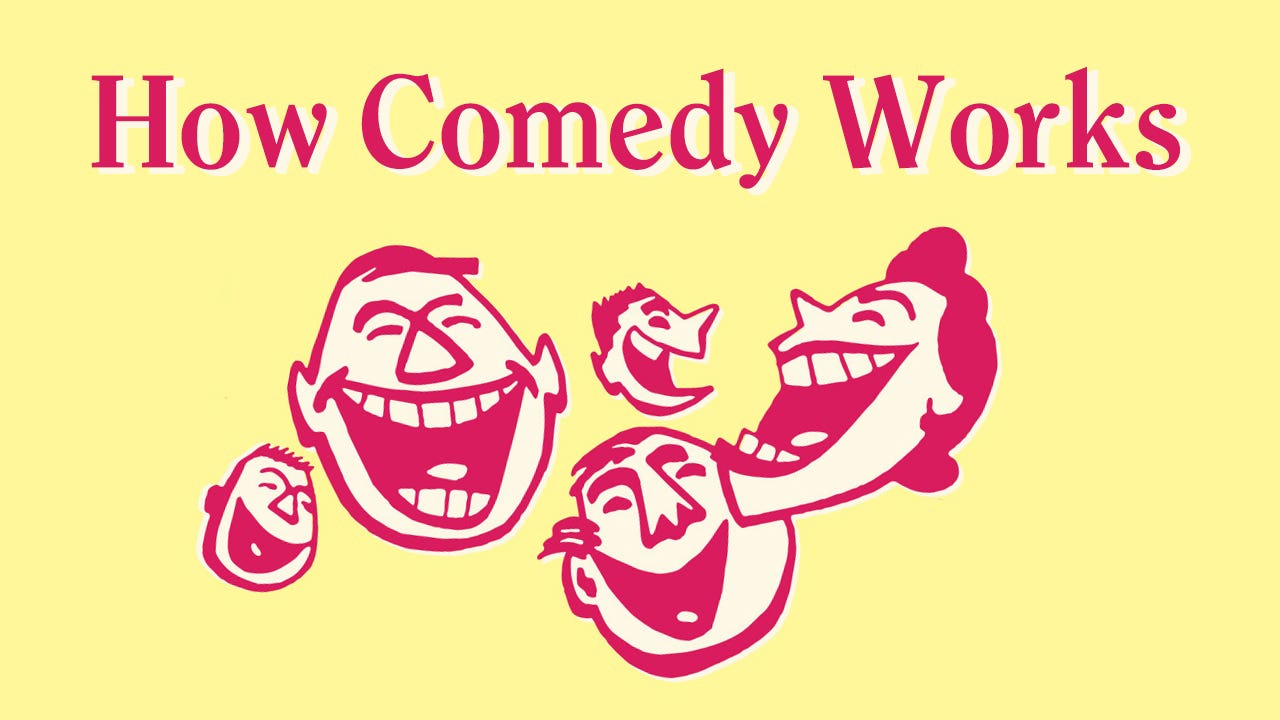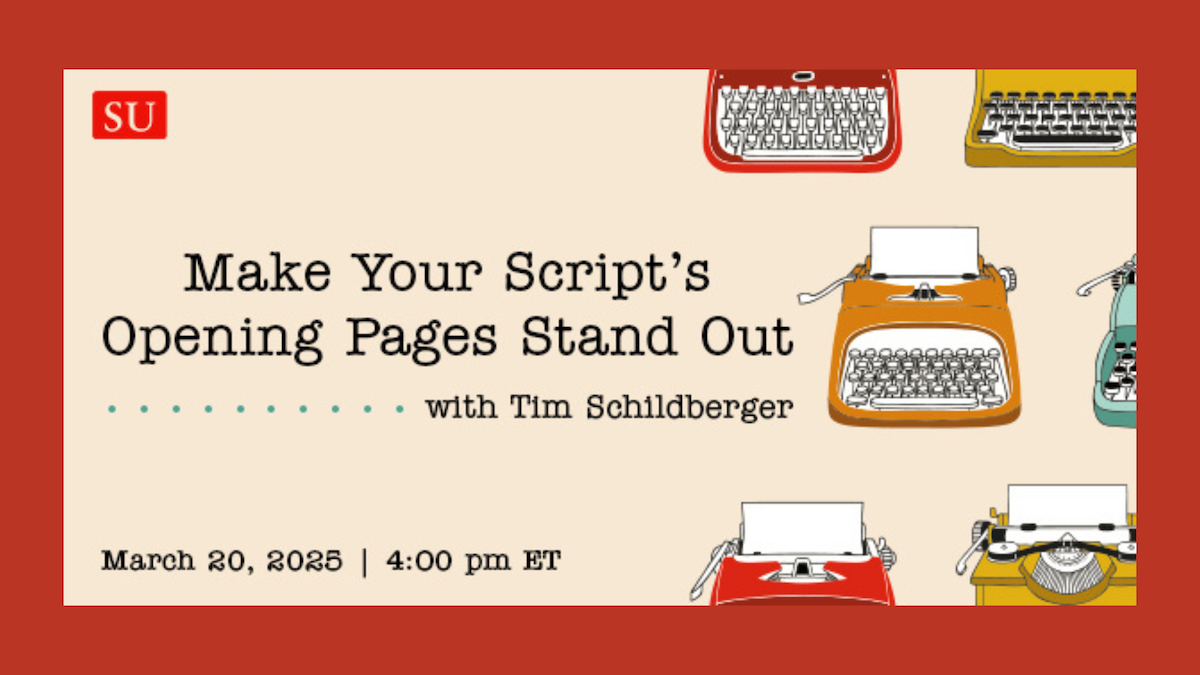Secrets of Comedy Revealed
Emmy-nominated writer David Misch interviews… himself… about the secrets of comedy writing.
An interview with David Misch by David Misch
Click to tweet this article to your friends and followers!
On Saturday, Jan. 24 2015, David Misch presents his seminar “Understanding Comedy: The Rules” at the Writers Store. We sent longtime David Misch fan David Misch to interview David Misch at a palatial estate in Beverly Hills. Then, when we got the correct address, we sent him to Misch’s home.
Hello David – nice to meet me.
The pleasure is all mine.
But enough of this gay banter. Why are you giving a class on comedy itself, rather than screenwriting?
Everywhere I speak, people say the same thing: “Misch? I thought it said Milch. Refund!” After I explain that I’ve already spent their money, they ask why I don’t teach comedy writing like so many others.
Well, because most of those others do it really well. I’m not sure I can add anything to the oft-proclaimed principles of screenwriting – inciting incident, frustrated goal, cat-rescue.
What I can do is drill deep into something more fundamental, what comedy is, in the belief that knowing how something works will help you do it better.
Doesn’t trying to explain comedy kill it?
People say that, don’t they. But they can’t explain how explaining a joke kills the joke if the joke’s already killed (made you laugh). Timing, right? Don’t explain a joke before telling it.
But who does that? And does explaining a punchline somehow go back in time and kill the joke, a kind of Titter Terminator? (Or, to be more current, a Laugh Looper.)
The idea behind “Understanding Comedy: The Rules” (not to mention Funny: The Book / Everything You Always Wanted To Know About Comedy which, as long as you brought it up, is available at fine bookstores everywhere as well as Ye Olde Internette, in print and e-book) is that people study art, history, art history, and the history of art history, but for some reason comedy’s seen as off-limits.
Why should comedy be the one art form that suffers from analysis? Doesn’t it make sense that knowing more about how comedy works will help you do it better? Everyone who disagrees with me, raise your hand.
I see no hands so I’m clearly right.
Okay, so explain comedy.
Sure! The secret to comedy is… hey, wait a minute, are you trying to get me to tell you for free? Damn, that almost worked, I was this close… (I’m holding two fingers really close together.)
I’ll give this much away: comedy works according to the principles of tension and resolution, misdirection, pattern recognition, and surprise.
Of course, those are the principles of every art form. But the specifics of comedy are unique, and the precision it requires is – at least to non-professionals – often unrecognized. In most dramas, changing a few words won’t have a huge effect. But in comedy, changing a word, even a syllable, can mean the difference between laughter and reactions ranging from hostile silence to physical violence. (Yes, I once was a standup.)
You claim there are comedy rules but aren’t rules made to be broken?
No, rules are made to be followed.
I’m just saying.
But point taken: no one gets anywhere by slavishly following rules. Still, few people get anywhere by ignoring them. The idea is to learn them and master them then break them, or at least defy them by getting your laughs in unusual ways.
All the top comedy people know the rules, if only unconsciously. And there are only two ways to learn them: lots of work, or getting told. The Rule of 3 didn’t spring fully formed from a nutty Neanderthal’s test beaker (bet you didn’t know Neanderthals had lab equipment) but from the success and failure of a thousand thousand writers and standups and drunk uncles at Thanksgiving dinners. Every comedy person rediscovers these rules; this class is about giving you a leg up.
And speaking of discovering what’s already been discovered, my first —
(Skippable but directly relevant and mildly amusing anecdote follows.)
— writing job was “Mork and Mindy”, and getting an episode on the air proved to be torment. I struggled for days, weeks, trying to think of a story that wasn’t too weird or too familiar.
Finally I got one. I pitched it to the producers and writing staff… and they liked it! I was thrilled. As I left the room, I turned to another writer, an older guy who’d written for “All In The Family” and many other series.
“I’m so relieved,” I said. “I was afraid you guys thought my story wouldn’t work.”
“Oh we know it’ll work,” he assured me. “It worked on ‘Newhart’, it worked on ‘Taxi’, it worked on ‘Cheers’…”
(End anecdote.)
Once you’ve learned the rules of comedy you have more creative resources, because in knowing why something works you can adjust the formula and get laughs in a way that doesn’t simply mimic the devices of others but is an expression of your own personality and talent.
Your seminar is about comedy, not acting or screenwriting.
Please put that in the form of a question.
Your seminar is about comedy, not acting or screenwriting?
Yes, but the principles I cover apply to acting, writing, directing; full-length features, sketches, one-liners; foreign policy and real estate investment. (Note: Two of those are a lie.) They all drink from the same comedy trough (a poetic albeit unappetizing metaphor) in that all human beings laugh, in any situation, for the same basic reasons. Discovering those reasons is the key to making them laugh at what you do.
No offense, but is this class just going to be hours of you blabbing?
I do take offense. “Blabbing”? I’ll have you know that I carefully vary my vocal timbre and have an extremely animated face, powered by Pixar® technology, so that this class is guaranteed [Note: There is no guarantee] to keep you on the edge of your seat, especially if you’re so fat that you’re on the verge of falling off anyway.
No offense.
But seriously…
While the class contains no direct instruction, the principles I talk about are illustrated with a variety of clips from TV shows and movies, demonstrating how they work outside the lab. Many of these clips are extremely piquant. Droll. Diverting. How you say in this country?… um… Funny.
I understand that as part of this seminar you will analyze jokes. I, sir, am a serious student whose comic conundrums spring from surprising stories and carefully conceived characters. I do not, sir, I do not stoop to stupid jokes; surely there is no reason for me to analyze them.
There is, and don’t call me Shirley. (Did I mention I worked with Zucker-Abrahams-Zucker on “Police Squad!”, the TV show that came after “Airplane!” and led to “The Naked Gun” movies? ’Cause I did.)
I like to call jokes “comedy in miniature”. (I like to call my cat “No! Not on the rug!”, but that tends to be situational.) Looked at in a certain way – the way I look at it – the structure of jokes mimics the structure of everything from a sketch to a sitcom to a feature to a novel. The big difference is that they’re small, which makes them easier to pull apart, to see what makes them tick. Which helps you see how comedy ticks. Which helps you make it. Which is why explaining it is valuable. Which brings us back to the beginning…
Doesn’t trying to explain comedy kill it?
No.
Among David Misch’s TV and movie credits are the Emmy-winning “Mork and Mindy,” the Emmy-losing “Duckman,” the Emmy-besotted “Saturday Night Live,” and the Emmy-ineligible “The Muppets Take Manhattan.” He’s also a playwright, songwriter, blogger, teacher, and recovered stand-up comic. Visit David's website and follow him on Twitter @FunnyTheBook.
UNDERSTANDING COMEDY: The Rules by David Misch
Saturday, January 24, 2015 - 2:30pm to 5:30pm at The Writers Store in Burbank, CA
REGISTER NOW
Top screenwriting and film publication, founded in 1989, published by Active Interest Media. Twitter: @scriptmag







